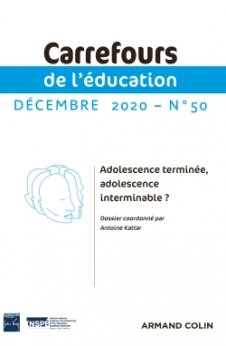
Carrefours de l'éducation n°50 (2/2020)
Pour acheter ce numéro, contactez-nous
Recevez les numéros de l'année en cours et accédez à l'intégralité des articles en ligne.
Cet article se propose de traiter la thématique du dossier à travers la figure de l’enseignant débutant du secondaire en France. Il s’appuie sur les résultats d’une recherche menée dans le cadre d’un travail de thèse. Celle-ci s’inscrit dans la lignée des travaux menés avec une démarche clinique d’orientation psychanalytique. Si l’on suit L.-M. Bossard, il semble que l’enseignant est susceptible, dans le temps de son début de carrière, de traverser une « crise d’adolescence professionnelle ». Reprenant cette proposition et la caractérisation de l’enseignant débutant comme « adolescent professionnel » ma recherche s’est centrée sur la possible réactivation chez l’enseignant débutant lors de son passage d’étudiant à enseignant, d’éléments propre à l’adolescence et notamment en lien avec sa bisexualité psychique interne. Mon matériel est constitué d’entretiens cliniques de recherche couplés à des observations « ultra-cliniques ». En appui sur un extrait de mon corpus, j’indiquerai comment, chez l’enseignant pris dans le moment de son début de carrière, la confrontation à l’adolescence de ses élèves semble pouvoir réactiver certains éléments de sa propre crise adolescente. Ce jeu de miroir entre un enseignant débutant aux prises avec sa propre adolescence professionnelle et des élèves adolescents peut être source de difficultés tant chez l’enseignant que chez les élèves. Comment dès lors ces professionnels débutants peuvent-ils aider les adolescents qui leur sont confiés à vivre avec la part de conflit et d’ambivalence propre à l’adolescence ? J’avancerai quelques propositions de compréhension de la façon dont peut se jouer pour un enseignant du second degré la sortie de « l’adolescence professionnelle » vers un stade d’« adulte professionnel ». Ces hypothèses s’articulent autour d’une tentative de transposition chez l’enseignant de la notion de parentalité psychique interne.
This paper will take a look at the problems raised by its main theme through the figure of the beginning teacher in French secondary schools. It follows up on research for a doctoral thesis, a thesis in line with a clinical approach informed by psychoanalysis. According to L.-M. Bossard, teachers are susceptible, at the beginning of their careers, to a “professional adolescent crisis”. In following upon this observation and upon the characterisation of a beginning teacher as a “career adolescent”, my research concentrated on the possibility that could be reactivated in the beginning teacher at the moment of passage from student to teacher a number of elements proper to adolescence and in particular having to do with his or her internal psychic bisexuality. Ma data consist in clinical research interviews and “ultra-clinical” observations. Using an excerpt from my corpus, I will show how in the teacher studied at the beginning of his career, confrontation with the adolescence of his pupils will reactivate certain elements of his own adolescent crisis. This mirroring between a beginning teacher with his own career adolescence to deal with and adolescent pupils can be a source of difficulties both for the teacher and for the pupils. How then can these beginning professionals help the teenagers in their charge live with the conflicts and ambivalence that characterise adolescence? I have a number of hypotheses as to how passing form “career adolescence” to “professional adult” can play itself out for a secondary school teacher. These hypotheses are articulated by the transposition to the teacher of the notion of internal psychic parentality.